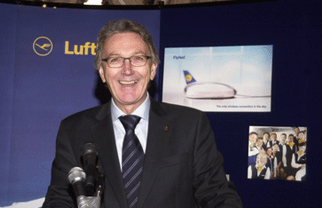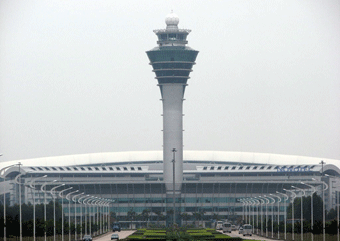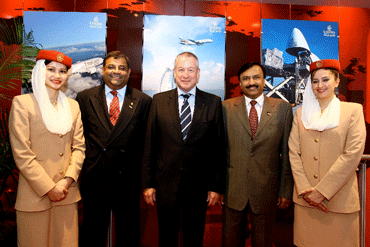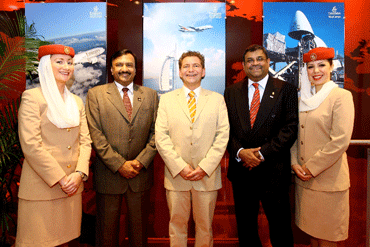

 |
 |
|
| |
||
|
Vol. 7 No. 135 WE COVER THE WORLD Friday December 5, 2008 |
 Austria’s
1957 formed national carrier Austrian Airlines (AUA) will lose its independence
this Friday by joining German heavyweight Lufthansa. Yesterday, Lufthansa’s
supervisory board paved the way for the take-over by deciding to purchase
41.5 percent of the Vienna-based airline from state run Austrian holding ÖIAG
(Oesterreichische Staatsholding).
Austria’s
1957 formed national carrier Austrian Airlines (AUA) will lose its independence
this Friday by joining German heavyweight Lufthansa. Yesterday, Lufthansa’s
supervisory board paved the way for the take-over by deciding to purchase
41.5 percent of the Vienna-based airline from state run Austrian holding ÖIAG
(Oesterreichische Staatsholding).
Today (Friday) the ÖIAG board members will
sit together to finally seal the deal. Depending on AUA’s upcoming financial
results during the next months and the performance of Lufthansa’s own
shares, the German carrier will pay at minimum €366,000 euros with a
performance trigger upwards for the 41.5 percent.
Parallel, AUA minority stakeholders will be
offered a sum to sell their widespread shares to LH. Finally the German airline
expects to possess a total of 75 percent in the Alp’s carrier with the
Vienna government holding the remaining 25 percent.
“It’s a perfect pact because now
both players are finally becoming Austrian,” commented an AUA manager
ironically by referring to  Austria-born
Lufthansa CEO Wolfgang Mayrhuber (pictured right).
Austria-born
Lufthansa CEO Wolfgang Mayrhuber (pictured right).
AUA is the newest member joining Lufthansa’s
orbit after the carrier announced the take over of Sabena successor Brussels
Airlines (SN) and UK-based bmi beginning next year. Stronghold of the airline
is Russia and the eastern European markets where AUA offers a bright variety
of routes and frequencies.
Further, LH has just shaped a ‘Lufthansa
Italia’ named airline to offer short and medium-haul scheduled flights
out of Milan’s airport Malpensa commencing next February. Six Airbus
A319s will be based there to connect the thriving northern Italian city with
places like Barcelona, Paris, London or Budapest.
AUA’s Executive VP Cargo Franz Zoechbauer
(pictured left) favors a Swiss WorldCargo model for his air freight division
under the German crane’s wings giving his entity a great deal of autonomy.
“Similar to Swiss we are a pure belly-hold capacity provider with no
single freighter in our fleet.” To add to that “our strategy is
to offer our clients quality instead of mass.”
By collaborating with Lufthansa Cargo, he expects
synergies on flights to and from Eastern Europe as well as on long haul routes.
“Especially time critical express shipments and our new ‘cool’
product that we intend to launch next January.”
Next to come are mutual project groups to closer
define the many tasks both carriers have put on their flip charts.
Heiner Siegmund
 Shanghai
Exclusive—In a major effort to support the troubled cargo carriers
and promote the development of international cargo business in this difficult
time, South China’s Guangzhou local government has established the financial
support fund at the end of November to subsidize international cargo routes.
Shanghai
Exclusive—In a major effort to support the troubled cargo carriers
and promote the development of international cargo business in this difficult
time, South China’s Guangzhou local government has established the financial
support fund at the end of November to subsidize international cargo routes.
All carriers in service from January
2008, and all newly launched international cargo routes commencing from Guangzhou
Baiyun Airport, one of the three major airports of China, under the plan are
eligible receive annual fiscal subsidies of no more than RMB10 million per
aircraft for base airlines and RMB8 million for non-base airlines.
Similar measures were issued in 2007
by Guangzhou’s neighbor city, Shenzhen; and offered RMB20 million to
Donghai Airlines and Jade Cargo International at the end of 2007 to subsidize
their new cargo routes from Shenzhen Airport.
Guangzhou Baiyun Airport currently
operates seven international all-cargo routes, flying to Tokyo, Seoul, Frankfurt,
Paris, etc., all of which are on the list.
In total, around ten carriers operating
on these routes will benefit from this plan, with UPS and Air France taking
the largest part.
Both airlines and Baiyun airport welcome
this plan, expressing its positive effect on helping carriers maintain and
expand international cargo routes at Baiyun Airport.
Affected by the ongoing world economic
recession, China’s civil aviation ended its years’ double-digit
growth in the first ten months of 2008, however both passengers and cargo
and mail grew less than 5 percent year on year. And some international routes,
showed even negative growth.
Profits of the entire China civil aviation
industry turned to negative in the first ten months, with airlines losing
over RMB6 billion in the third quarter as massive losses for the year continued.
David
 |
 |
So how do you overcome the challenge
of securing a picture of two people but can’t gather them at the same
time?
You take two pictures of course.
In the photo left Emirates cabin crew flank
Ram Menen, Emirates Divisional Senior Vice President Cargo, Heiner Sass, Managing
Director, Globe Air Cargo, and Prakash Nair, Emirates Manager Network Cargo
Sales Development.
Globe Air Cargo is a European Cargo Service
(ECS) company that specializes in Hungary, Romania and Bulgaria.
Emirates said that Mr. Sass & Co. now head
up Emirates SkyCargo’s sales effort in Romania and Bulgaria.
In the photo right, the other guy is Wolf Maria
Taborsky, Globe’s Managing Director Eastern Europe.
Prakash Nair, said:
“Globe Air Cargo can leverage significant
opportunities available to us in Central Europe where we operate an extensive
trucking network throughout the region, transporting cargo from offline points
to stations we serve directly.”
Geoffrey